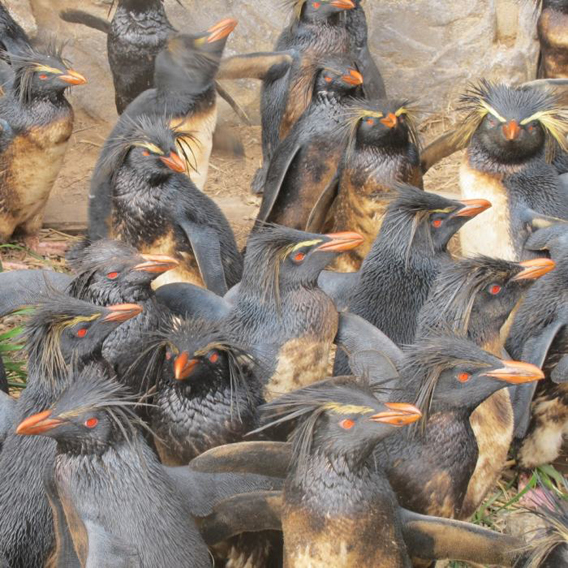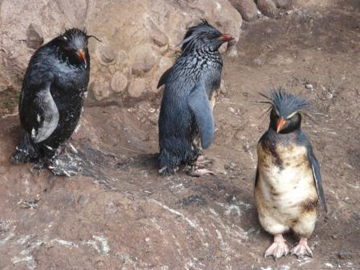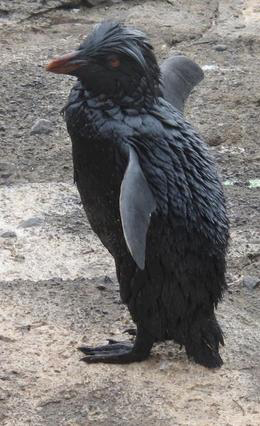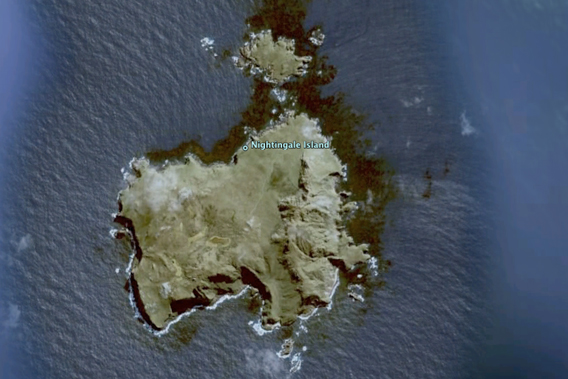
Northern rockhopper penguins covered in oil. Photo by: Tristan Conservation Team of Simon Glass, Wayne Swain and Matthew Green. Courtesy of: The Tristan da Cunha
Website.
Disturbing photos show northern rockhopper penguins (Eudyptes moseleyi) hit hard by an oil spill from a wrecked cargo ship on Nightingale Island in the Southern Atlantic. Already listed as Endangered by the IUCN Red List, the oil spill threatens nearly half of the northern rockhopper population according to BirdLife International. Already conservation workers say ‘hundreds’ of penguins have been oiled.
Located the remote Southern Atlantic, Nightingale Island is a part of the UK’s Tristan da Cunha archipelago. The island’s are home to a variety of birdlife, including species that survive no-where else but on the archipelago.
 Northern rockhopper penguins coated in oil. Conservation workers say they have discovered at least 250 penguins with oil. Photo by: Tristan Conservation Team of Simon Glass, Wayne Swain and Matthew Green. Courtesy of: The Tristan da Cunha Website. |
Workers with the Tristan Conservation Team have been sent to the oil spill to aid the wildlife, including the penguins. However, Nightingale has no fresh water, so the penguins will have to be transferred to Tristan da Cunha Island to be cleaned.
Workers found an “awful scene” with an oil slick ranging “from thin films of oil, small balls and larger clumps of tar with the smell of diesel everywhere,” according to the Department.
In addition, a tugboat has been sent from the nearest coast—South Africa—to drag the broken craft away. Fortunately, all 22 employees of the wrecked cargo craft are safe. The tug boat is also bringing an environmental expert, Estelle van der Merwe, with experience in working with oiled birds as an advisor.
 Northern rockhopper penguin covered in oil. Photo by: Tristan Conservation Team of Simon Glass, Wayne Swain and Matthew Green. Courtesy of: The Tristan da Cunha Website. |
Along with the pollution, the wreck could add another environmental disaster to the islands’ bird life.
“Nightingale is one of two large islands in the Tristan da Cunha group that are rodent-free. If rats gain a foothold, their impact would be devastating,” expalins Richard Cuthbert, a research biologist with Britain’s Royal Society for the Protection of Birds (RSPB). The conservation team has already set rat traps in preparation of a rat infestation.
The oil spill, which spreads over 8 miles (13 kilometers), also threatens the remote islands’ main economic source: fishing. The population of Tristan da Cunha is just under 300 people.
Rockhopper penguins are easy to identify, sporting long yellow spiked plumes and red eyes. Their unique look made them one of the stars of the popular animated film, Happy Feet.
Though beloved around the world, penguins are among the world’s most threatened bird families. Industry fishing, which competes with penguins for their fish, habitat destruction, climate change, and disasters such as oil spills has pushed 60% of penguin species to be considered threatened with extinction.

Nightingale Island as viewed from Google Earth.
Related articles
Hundreds of endangered penguins covered in oil after remote spill
(03/21/2011) Conservation workers have found hundreds of oiled northern rockhopper penguins (Eudyptes moseleyi) after a cargo vessel wrecked on Nightingale Island, apart of the UK’s Tristan da Cunha archipelago. Northern rockhopper penguins are listed as Endangered by the IUCN Red List. According to a press release by BirdLife International, the spill threatens nearly half of the world’s northern rockhopper population.
Gulf of Mexico bottom still coated in oil, recovery long way off
(02/21/2011) Samantha Joye of the University of Georgia has seen the bottom of the Gulf of Mexico and the view wasn’t pretty. Speaking at the American Association for the Advancement of Science, Joye told the conference that she found places where oil lay on the Gulf floor nearly 4 inches (10 centimeters) thick. Joye’s findings contradict rosier pictures of the overall damage caused by the 2010 BP oil spill, including a recent statement by Kenneth Feinberg, the US government czar for oil compensation, that the Gulf would largely recover by next year.
The penguin crisis: over 60 percent of the world’s penguins threatened with extinction

(06/10/2010) Everyone loves penguins. With their characteristic black-and-white ‘tuxedo’ markings, upright waddle, and childlike stature, penguins seem at once exotic and familiar: exotic because they live far from most human habitations, familiar because they appear innumerable books and movies. From Mr. Popper’s Penguins to Happy Feet, and from March of the Penguins to And Tango Makes Three, penguins pop-up everywhere. The flightless birds have even provided the name and symbol to one of the world’s most successful publishing houses. Yet despite their popularity amid the human kingdom, few people seem aware that penguins worldwide are facing an extinction crisis.







